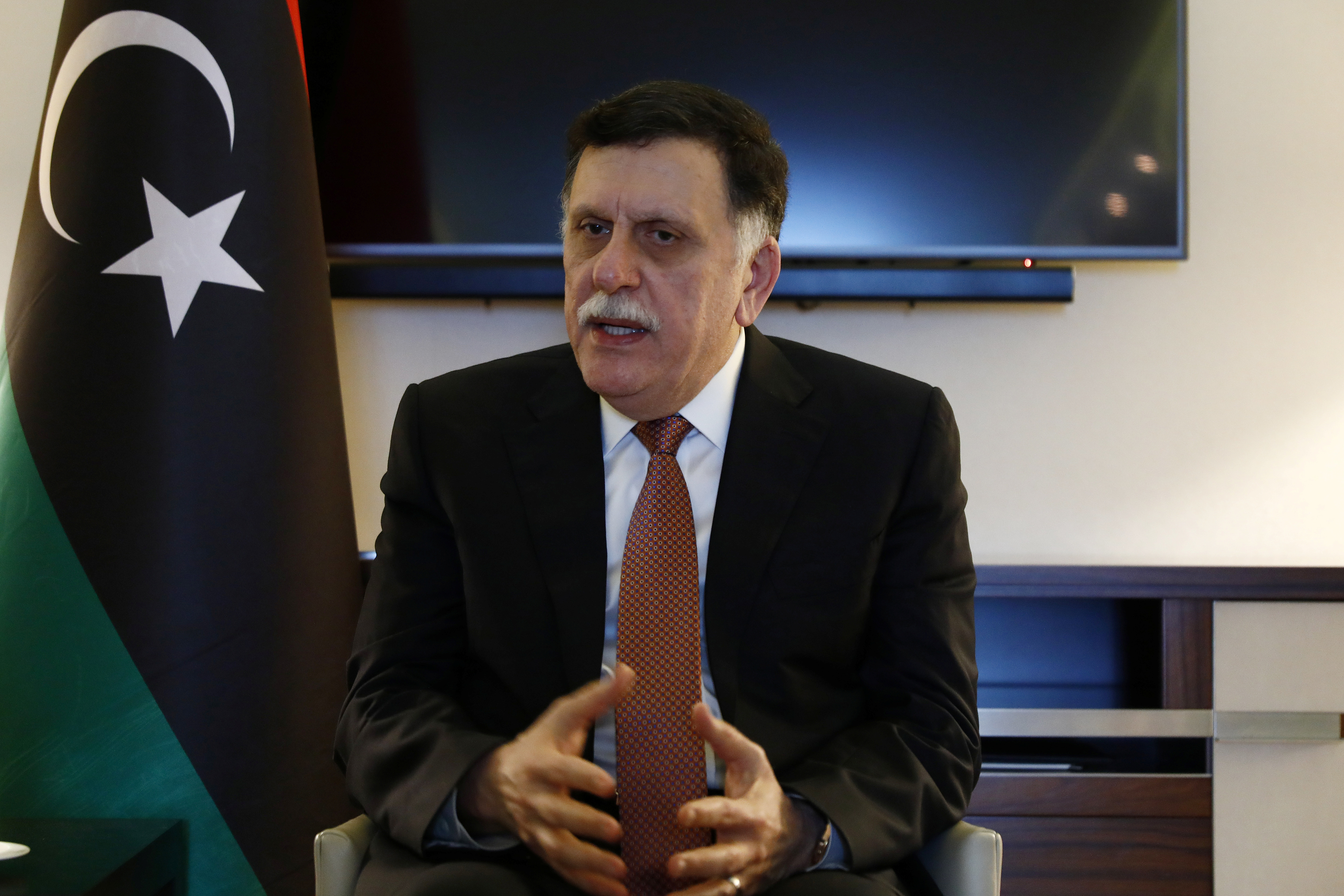By Ulf Laessing and Nadeen Ebrahim
BERLIN (Reuters) - Libya will face a "catastrophic situation" unless foreign powers put pressure on eastern-based commander Khalifa Haftar to lift a blockade of oilfields that has cut output to almost zero, the country's internationally recognised premier said on Monday.
Since Friday, Haftar's forces have closed Libya's major oil ports in a power play as European and Arab powers and the United States were meeting with his supporters in Berlin to push him to halt a campaign to capture the capital Tripoli.
Tripoli-based Prime Minister Fayez al-Serraj told Reuters he rejects eastern demands to link a reopening of oil ports to a new distribution of oil revenues among Libyans, saying such income was in any case meant to benefit the entire country.
"The situation will be catastrophic should it stay like this," Serraj said in an interview in Berlin.
"I hope foreign countries will follow the issue," he said when asked whether he wanted them to lean on Haftar to lift the blockade of Libya's Mediterranean oil export terminals.
Much of Libya's oil wealth is located in the east of the sprawling North African state but revenues are channelled through Tripoli-based state oil firm NOC, which says it serves the whole country and stays out of its factional conflicts.
Haftar's parallel administration has repeatedly sought to export oil while bypassing the NOC but has been thwarted by a United Nations ban, diplomats say.
The NOC sends oil and gas revenues, Libya's economic lifeline, to the Tripoli-based central bank, which mainly works with Serraj's government though it also funds some public salaries, fuel and other services in the Haftar-controlled east.
A document sent to oil traders and seen by Reuters on Monday said that the NOC had declared force majeure - a waiver on contractual obligations - on crude loadings from the Sharara and El Feel oilfields in Libya's southwest.
At least nine oil tankers had been due to load in the coming days from the ports now under force majeure, according to a local shipping source. The NOC had previously declared force majeure for oil ports on Libya's northeast coast.
Libya has lacked a stable central authority since strongman Muammar Gaddafi was overthrown by NATO-backed rebels in 2011. For more than five years, it has had two rival governments, in the east and the west, with streets controlled by armed groups.
RESPECT FOR CEASEFIRE
In the interview, Serraj also said his government would respect the summit's decision to turn a tentative truce into a permanent ceasefire in Tripoli and open intra-Libyan talks to end conflict as part of a U.N.-led plan.
But he ruled out meeting Haftar again. In Berlin Serraj and Haftar conferred with world leaders but not meet each other.
"For me it's clear....We will not sit down again with the other side," Serraj said, adding that the question of peacemaking should not be limited to a meeting of two leaders.
Serraj and Haftar, once a senior army general under Gaddafi, last met in Abu Dhabi in February 2019 where they failed to reach a power-sharing agreement, after which Haftar launched his offensive on Tripoli.
Sunday's Berlin summit convened the main foreign supporters of Libya's warring sides. Haftar enjoys the support of the United Arab Emirates, Egypt, Russian mercenaries and some African troops, while Serraj is backed by Turkey.
The summit yielded a commitment to shore up Libya's ramshackle truce arrangement but the gathering was overshadowed by Haftar's oil blockades.
The European Union's top diplomat, Josep Borrell, said on Monday the EU would discuss all ways to uphold a formal ceasefire in Libya but any peace settlement will need real support from the bloc to make it stick. [nL8N29P1K9]
Under the Berlin deal, a joint committee will be formed, made up of five military men from each side, and convene in Geneva in about a week to discuss the mechanics of a viable ceasefire to pave the way for a resumption of peace diplomacy.
"Unfortunately the (Haftar-led) attackers have continued to violate a truce and haven't signed it anyway," said Serraj, referring to a meeting in Moscow last week where Haftar refused to endorse a ceasefire scheme. Serraj put his signature on it.
"We look forward to the committee meeting," Serraj said.
Many are sceptical about any ceasefire's prospects due to a lack of mutual trust and a massive deployment of Haftar's forces into the northwest in their bid to take Tripoli.

Turkish support for Tripoli's effort to repel Haftar has seen the fighting, which has displaced more than 150,000 civilians, take on the trappings of a proxy war.